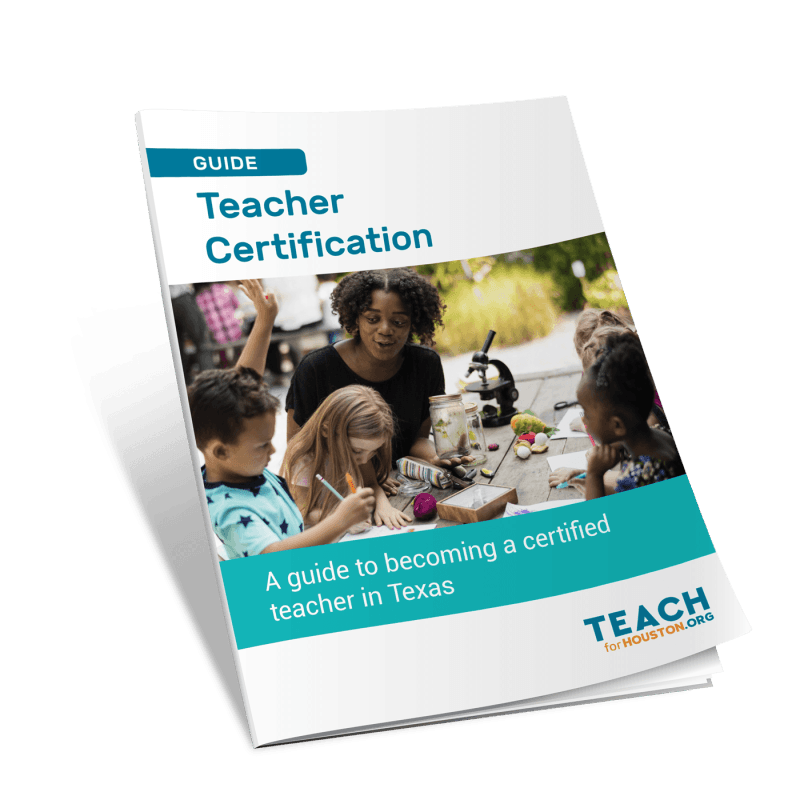Wondering how to become a teacher? The right pathway for you will depend on your educational background and career experience.
On this page, we’ll go over each step you’ll need to take, plus answer some commonly asked questions about certification. Let’s dive in!
Steps to Becoming a Teacher in Texas
- 1
Earn a bachelor's degree from a state-approved college or university
Ideally, your bachelor’s degree will be in a field closely related to the subject you want to teach. If it’s not, that’s okay! Learn more in our FAQs.
Keep in mind that you can earn your bachelor’s degree and teaching certificate at the same time—so if you're an undergraduate, skip to Step 2.
- 2
Decide what you want to teach
When you enroll in a teaching program, you'll need to know the subject and grade level you want to teach. At any level, getting certified in a shortage area provides more job opportunities.
- 3
Apply to teaching programs and enroll
Make sure to find a program that offers your chosen certification area! You can look for certification programs with the TEACH for Houston Program Explorer.
If you don’t have a bachelor's degree:
Many programs combine a teaching certificate with a bachelor’s degree, so you can get certified while you finish your undergraduate coursework.
If you have vocational experience, you may also be able to teach a Career & Technical Education subject without a degree.
If you have a bachelor’s degree:
If you have a bachelor's degree, you can choose from a few different pathways, including:
- Certification-only programs
- Master's degree and certification programs
- Alternative certification programs
TEACH for Houston can help you save money on teaching program applications! We’ll reimburse up to $100 for any expenses required for you to apply to a teaching program (like application fees, transcript fees and more). Get $100 back.
- 4
Pass Texas certification exams
You’ll need to take the TExES (a.k.a. Texas Examinations of Educator Standards). This test is meant to show you know your stuff well enough to teach it.
You’ll usually take this exam around the time that you finish your teaching program. (Your program may need to give approval before you can take the test.)
Not sure where to start with test prep? We’ve got tools for that too! Our Testing Guide and TExES Guide cover everything from registration to study tools to what to expect on test day.
- 5
Complete fingerprinting for a criminal background check
Finally, to get your teaching certificate in Texas, you'll need to complete a fingerprint check. The Texas Education Agency will evaluate any criminal history on a case-by-case basis. (1)
- 6
Submit a state application
Almost there! First, your teaching program will need to confirm that you’re eligible to apply for your teaching certificate. Once you get confirmation, you’ll apply directly to the Texas Education Agency.
Get the Certification Guide

The TEACH for Houston Certification Guide has everything you need to start your journey. Get details about teaching pathways, certification areas and steps to certification, all in one place!
It’s all free.
Frequently Asked Questions
What’s next
Houston Program Explorer
Ready to explore teaching programs? Find the right fit with our Program Explorer! Filter by degree, online options, tuition costs and more.
Explore ProgramsCareer Coaching in Houston
Talk to an expert about how to become a certified teacher in Houston. Get free advice on what to teach and how to choose and apply to the right program.
Read MoreHouston Guides
Put your best foot forward when applying to teaching programs in the Houston area. Reports & Guides deliver best practices for each step along the way, from studying for exams to applying for jobs and internships.
Read MoreReferences
- National Criminal History Checks - FAQs. Texas Education Agency. https://tea.texas.gov/texas-educators/investigations/national-criminal-history-checks-faqs
- Becoming a Classroom Teacher in Texas. Texas Education Agency. https://tea.texas.gov/texas-educators/certification/initial-certification/becoming-a-classroom-teacher-in-texas
- Carpenter, Jacob. "HISD board approves bigger-than-expected pay raise for teachers." Houston Chronicle. June 10, 2021. https://www.houstonchronicle.com/news/houston-texas/education/article/HISD-board-approves-bigger-than-expected-pay-16240364.php
- Educator Pay Data 2025. National Education Association. April 29, 2025. https://www.nea.org/resource-library/educator-pay-and-student-spending-how-does-your-state-rank
Sign Up for Free Resources
Enter your email to get FREE resources for future Texas teachers—from tailored advising to funding opportunities and more. Already signed up? Sign in at the top of the page to access your dashboard.
